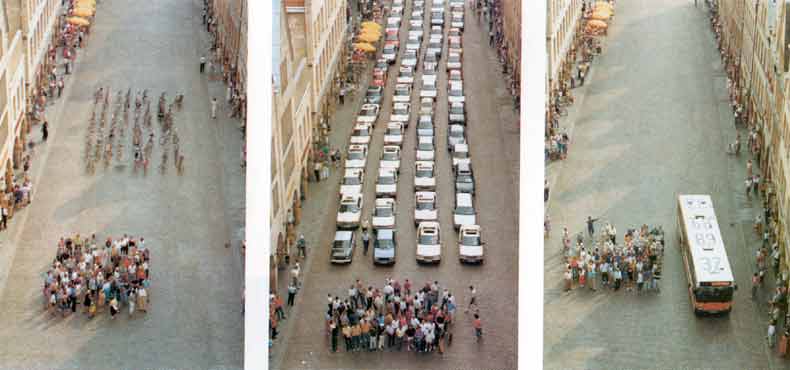Environment & Energy
Related: About this forumThe weird, secret history of the electric car and why it disappeared.
http://www.upworthy.com/the-weird-secret-history-of-the-electric-car-and-why-it-disappeared?c=upw1The first practical electric car was invented in 1884, back when we as humans were still, you know, figuring out what the heck a car was.
In fact, by 1900, more than a third of all vehicles on the road were electric. (Gas-powered cars made up just 22%, and the rest were steam-powered.)
Just like today's electric cars, the electric cars of a century ago had some major advantages over early gas-powered vehicles.
Early gas cars were clunky, loud, and dirty. Worse, drivers had to physically wrestle with the car to get it to move — every gear shift or hand-cranked start-up involved essentially arm-wrestling an ornery, hateful robot.
Electric cars, on the other hand, were easy to start, easy to drive, and quiet. They weren't exactly fast or long-range vehicles (they only went about 20 miles an hour), but this wasn't a problem in cities, where cars were primarily used. Plus the roads outside the city were pretty bad, and no one wanted to drive out there anyway.
These early electric cars had some major fans, too. The famous entrepreneur Thomas Edison backed electric cars, and even Henry Ford explored them as an option.
If electric cars had so many great benefits, why didn't they catch on? What went wrong?
braddy
(3,585 posts)Festivito
(13,452 posts)Our batteries become lighter, longer lasting, more prevalent, our infrastructure for help more pervasive.
So, battery cars catch our attention.
Hybrids are a step.
Maybe we will step into fuel cells next and carry a tube of hydrogen instead of gas, or will we find a lightweight battery the size of a briefcase.
Time will tell.
jtuck004
(15,882 posts)you can get from the same size electric engine - without counting for all the global warming you get with the former, of course.
I fill my gas car, I get 4-500 miles? I "fill" my Tesla - as if I had one - and I go 240 miles max.
I fill the gas car it takes 5 mins. I charge the electric it takes 4 hours or more.
There are other examples, but that is why. Efficiencies. There will be large tradeoffs, and people will have to think with electrics, whereas with gas they just waste and burn. People with money took advantage of this, but it was really just because petro gives far more power, is more portable, and has other uses - such as creating inorganic fertilizer, without which many people would starve.
But when the earth can't produce enough food, and people are fleeing the coasts as they rise, they will find out "efficiency" isn't all it was cracked up to be.
Beartracks
(12,816 posts)Or necessities?
Hmmm... ![]()
=================
jtuck004
(15,882 posts)it could match the petroleum-powered vehicle.
One just needs to take an electric chainsaw out for a day of work in the forest, if they question the efficiency, necessity, or convenience.
And as the application increases its appetite for power, the difference is even more stark. That applies to driving, warships, whatever.
As long as you don't count the air you breathe and the planet spaceship you depend on, which is how we have behaved for over a hundred years, petroleum is a cheaper way to get the job done.
'Course, there is that bill which is fast coming due...
One_Life_To_Give
(6,036 posts)Large portions of the country didn't have electricity or only had a local plant that ran at night. All the farm equipment being developed needed to have energy that electricity could not provide at the time. At the same time as advances in IC engine design made the tech far more suitable to the job. THe rate at which it could be further developed into a better tool for Autos/Trucks/ Planes etc exceeded what was technologically possible with Battery/Electric drive. Tube powered Electric Motor Controls in the age when every home having a AM radio was still years away wasn't realistic.
Beartracks
(12,816 posts)... across the United States for all kinds of electric-powered things, like refrigerators, washing machines, etc. The government made the investment through the REP to make that happen, and the public health and economic benefits were incalculable. And yet... the electric car didn't ride into these new markets like all the other electric time-saving, life-improving inventions. I guess the gas-powered machines were far too entrenched by then, meeting the needs of all the consumers already.
=====================
One_Life_To_Give
(6,036 posts)The fundamental technology still wasn't there even once electricity became common in most homes. Battery tech was still predominantly Lead Acid cells. Am Radio's were still a Luxury item in cars. Motor control using something more efficient than a Rheostat was a major undertaking. We don't really see good speed control in consumer devices until the Electric Wheelchair and Scooter show up in the 80's. The Rheostat may be fine for an electric mixer plugged into a wall or light circuit. But throwing half the power away as heat is not going to work in a battery powered transporter.
Following WW2 and all the R & D that had poured into Internal Combustion Engine design. The battery powered vehicle was hopelessly outclassed. Add in how the returning troops had learned to rely on the Jeep, Duece and a Half, DC3 and Harley. There was no reason for the typical consumer to even consider an electric car.
Finishline42
(1,091 posts)Looking for a conspiracy where one doesn't exist... as outlined above it was just the advantages of the technology at the time for IC engines vs electric.
Where the real conspiracy was with regard to electrically powered transportation was when GM, Firestone and Standard Oil of Calif got together and bought out streetcar lines and converted them to buses.
https://en.wikipedia.org/wiki/General_Motors_streetcar_conspiracy
MisterP
(23,730 posts)
an integrated system needs to be able to work with everything, together
hunter
(38,318 posts)Yes, the world would be a better place with fewer automobiles.